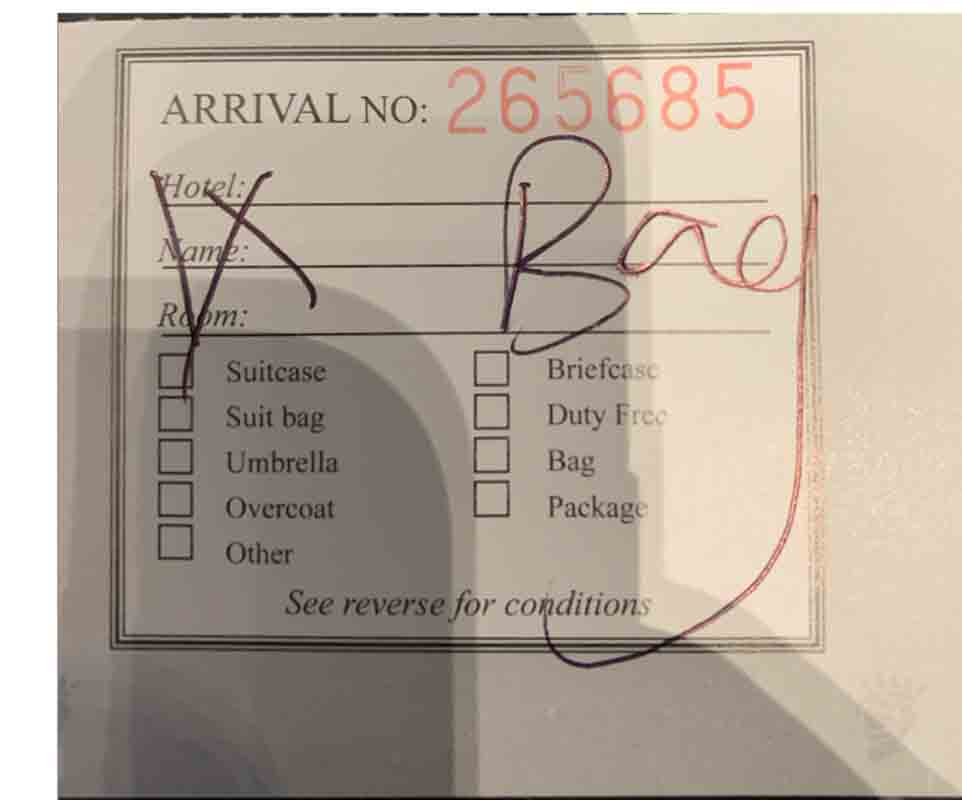When Marriott takes over The Stamford Hotel in Auckland, New Zealand, employees discover and throw away some seemingly abandoned luggage. (Surprise! It wasn’t.)
Two weeks later, the owner of those bags turns up at the Marriott looking for her now discarded belongings. Emily G. says the previous management assured her she could safely store her luggage at the hotel while traveling – and never mentioned that the property was about to switch hands.
Now Emily is asking Consumer Rescue for assistance. She values the contents of the suitcases Marriott tossed in the garbage at $5,000 and hopes we can get it.
But does Marriott owe her anything for the bags it trashed, and what should you do if you need to store your luggage abroad? That’s what we’re exploring today.
A once in a lifetime mother and daughter adventure
Last December, Emily and her mother set off on a once-in-a-lifetime adventure through New Zealand. In Auckland, they checked into The Stamford Hotel for a few days before exploring the rest of South Island.
But Emily had quite a bit of excess luggage that she didn’t want to carry around New Zealand.
I had just spent the last year living and working in South Korea. One of my large suitcases was filled with photos, letters, gifts, and other irreplaceable items from my year abroad. I didn’t want to have to drag that suitcase all over the place.
My mother had emailed a porter at The Stamford ahead of time. We chose this hotel because the porter said I could store my luggage for two weeks while we traveled around the country.
Emily to Michelle
After spending two nights at The Stamford, the now well-rested duo was ready to start their New Zealand adventure in earnest.
As they checked out of The Stamford, Emily dropped her large suitcase with a porter. She reminded him they would be back in a little over two weeks. In return, he handed her a small luggage tag which she quickly tucked away in her pocketbook.
Thinking back on that moment, Emily wishes she had looked more closely at that luggage tag.
Surprise! This hotel is now a Marriott and your stored luggage is gone
After enjoying 19 days of all that South Island of New Zealand has to offer, Emily and her mom made their way back to Auckland.
Arriving at The Stamford, a confusing scene appeared before their eyes: A Marriott hotel. At first, thinking they may have been dropped off at the wrong location, Emily double-checked the address. After confirming that they were indeed at The Stamford, she and her mom went inside.
Waiting in line to check in, Emily noted that the hotel looked different inside as well. A lot had changed in just a little under three weeks. She wondered what was going on.
At the front desk, a manager filled the pair in on the details. Just after they had checked out of The Stamford, Marriott had taken ownership of the property. The chain had closed the hotel for renovations, and it had just reopened as a Marriott two days before.
Although the timeline of events was undoubtedly bizarre, the hotel’s changing marque didn’t make a difference to Emily. That is until she attempted to reclaim her stored luggage.
“I showed [the manager] my luggage tag and asked for my bag,” Emily recalled. “He told me that Marriott didn’t have any record of my luggage I had stored with The Stamford.”
What did Marriott do with that big purple suitcase?
A stunned Emily asked the manager to be taken to the hotel’s luggage room to ensure her bag hadn’t been overlooked. Unfortunately, it was quickly apparent that there was no way her giant purple suitcase was hiding there.
Thinking of all the memories she had stored in that suitcase made Emily’s heart sink.
“Marriott representatives did the best they could to try to track down my luggage,” Emily told me. “They even contacted two other hotels where some displaced Stamford guests had been moved. My suitcase with all my irreplaceable things had simply vanished.”
Emily found the turn of events hard to fathom. The next day, she and her mom gathered their belongings (the ones they still had), checked out of the Marriott, and flew back to the United States.
Now Emily was on a mission. She was determined to find out who was responsible for her lost luggage – Marriott or The Stamford.
Asking Consumer Rescue to investigate
After several months of battling both the Marriott and The Stamford, Emily came across an article I had written about another traveler with a stored luggage fiasco.
In that case, a cruise ship passenger had misunderstood how to get her bags from the hotel to the port. She was under the false impression that the hotel offered such a transfer service. It didn’t.
That traveler left her bags with the hotel’s porter, got on a shuttle and boarded the ship with nothing but her handbag. She ended up cruising without her belongings for a week while her luggage remained safely stored at the hotel.
Of course, that plot was very different from Emily’s experience, but she hoped Consumer Rescue could help her too. By the time her complaint hit my desk, The Stamford was the focus of all her attention.
We would like The Stamford hotel to accept responsibility and be held accountable for the recklessness and lack of respect they’ve shown us.
We would also like to negotiate financial compensation because the suitcase had upwards of $5,000 in value. The Marriott hotel has been supportive of this claim and handled our situation with action and respect.
Emily to Consumer Rescue
I immediately noted multiple problems with this request for help.
Luggage liability limitations for hotels and airlines
Just like with airlines, in most countries, there are liability limits for hotel owners for a guest’s lost or damaged items. That is, as long as the loss is the fault of the hotel.
Although the Montreal Convention limits airlines’ liability for lost and damaged luggage to around $1,700 on international flights, innkeepers’ laws covering these losses are nowhere near that value. In fact, in New Zealand, that liability is set at around $100.
And to qualify for compensation, you must be able to prove the value of your items.
While it’s natural for a person to place a high price point on personal items they perceive as irreplaceable, these things often have no actual value to others. In reality, the items in Emily’s missing suitcase were things that had immense value only to her – the sentimental kind. Monetarily, the value of the contents (personal photos, letters and souvenirs) was probably close to zero.
I felt awful for her loss, but I knew it wouldn’t be possible to mediate a $5,000 “settlement” with either hotel for that missing purple suitcase with all her keepsakes inside.
Not only was the value of the loss of the luggage far too high, but there was another more significant problem with this complaint.
How Consumer Rescue mediates problems
Unfortunately, as I dug deeper into Emily’s lengthy paper trail, I discovered she had already engaged a lawyer in her battle. This is always a bad sign for me as a consumer advocate.
The Consumer Rescue team mediates problems in a friendly way; based on the terms and conditions of the company. My goal is to present every case in such a logical and factual way that the company actually wants to respond in the affirmative. And we all feel good at the end of the mediation process: consumer, business, and advocate.
Lawyers often don’t have that cordial tact, instead stating facts and making ultimatums. Unless all the details are unquestionably on the consumer’s side, this approach often fails (except in court). When I receive a case in which a consumer has first engaged an attorney, the damage is usually done, and it can be challenging to reengage a company on the consumer’s behalf.
Full disclosure: I’m married to an attorney, so the above observation is not meant as an insult to the profession. It’s intended as a statement of fact. Consumer advocates and lawyers typically approach mediation in very different ways.
In Emily’s case, the lawyer did precisely as expected; he made demands with ultimatums. The results were also exactly as expected: The Stamford politely ignored his demands.
This isn’t a contract to store your luggage
Emily’s mom began to send me her paper trail as well. She believed that her daughter’s “contract” was with The Stamford, and she wanted the owner of that company to pay the $5,000. She suggested that if I found the insurance company of the hotel, then they could file a claim that way.
If a hotel offers a luggage storage service, gives you a contract, and bills you per day, then a strong case can be made that it is liable for your loss. In that situation, the hotel will most certainly have insurance to protect itself from losses.
With that in mind, I asked to see this contract, and that is where Emily’s case fell apart.

I could see now very clearly why the lawyer had no success in pursuing this case. This tag has zero identifying information – it doesn’t even mention the hotel, the guest’s name, OR what exactly is being handed over. There are also no details as to how long the luggage (or whatever item) will be stored.
“See reverse for conditions.”
Anyone who has received one of these standard tags can already guess that the other side likely says the hotel has no or limited liability.
I asked Emily’s mom to flip the tag over so we would find out the terms of this anonymous storage.
“I don’t know where the tag is now,” she told me. “If I find it, I will send it to you.”
Now my shenanigans detector was starting to go off.
Wait a minute: Hasn’t Marriott already paid for the stored luggage?
It probably doesn’t come as a surprise to our readers that sometimes consumers will withhold critical information to sway our advocacy efforts.
In this case, based on the paper trail, it seemed clear that when the renovation crew entered the property days after Emily left, her bag had been disposed of. So when Emily and her mom continued praising Marriott in all of their messages to me, it seemed curious.
Then buried inside one of the many emails I reviewed, a representative from The Stamford mentioned that Emily had already received compensation for the luggage.
I asked “mom” about this, and that’s when she revealed that Marriott had paid her $2,500 for the lost luggage already.
“Yes, Marriott paid us $2,500 — that’s half of the value of what we’re claiming,” Emily’s mom told me. “We want The Stamford to take responsibility for the other half. They need to be held accountable.”
I felt a little duped at that point. I certainly would not have spent time on this case if I had known upfront Emily had already been compensated $2,500 for that giant purple bag with all the trinkets inside.
Marriott paid $2,500 for the luggage that ended up in the trash
Before I closed this case, I had a few thoughts to share with the mom and daughter.
The fact that Marriott reimbursed you $2,500 is extraordinary under these circumstances, which would suggest that they accept responsibility for your lost stored luggage. There would be no other reason for Marriott to pay anything to you.
I believe if you locate that tag, you will find that the back of it says that the hotel is not liable for any loss and that you shouldn’t leave valuable items there. I’m basing this on other luggage tags at hotels I’ve seen.
I don’t believe there is any possible way an insurance company for the hotel would pay for your loss because you never had a luggage storage contract with the hotel (you can double-check that with your lawyer).
Insurance is highly regulated, and an underwriter will only pay for things that are spelled out in the policy.
I think you’ve received the upper limit of what you can expect for the missing bag.
Michelle Couch-Friedman, Consumer advocate
Ultimately, “Mom” thanked me for reviewing their plight and had one final question.
“Question: I’ve left luggage in the past and have never had a contract,” Mom asked me. “Just a luggage tag from the hotel concierge. What should we have done?”
I’m happy you asked. Here’s your answer…
How to safely store your luggage abroad while traveling
In your travels, you may find times that it would be convenient to store your excess luggage. Worldwide, there are reliable and secure ways to temporarily relieve yourself of your suitcases at a cost. Leaving your belongings behind at a hotel without a contract or formal agreement is not one of them.
Here’s what you need to know about safely storing your luggage abroad.
Professional luggage storage companies
Most cities have professional storage units where you can temporarily place your belongings. These companies are bonded and insured, and you can enter into a short or long-term contract to store your luggage.
You’ll be given a contract detailing the terms of use of the storage unit and the daily, weekly, or monthly rate. The contract will also define the liability limits of the storage company. A professional storage service will protect you if your belongings are damaged or go missing.
Pro tip: You can use an app like Bounce to help locate professional luggage storage near you, anywhere in the world. Bounce can quickly give you local storage options and rates. Even better, if you book through the app, you’ll also receive up to $10,000 worth of insurance protection for your belongings.
Luggage storage at the airport
Some airports, like Auckland International, offer convenient luggage storage options. Depending on the location, you may find self-service lockers or full-service luggage storage where you can pay an hourly or more extended rate.
Note: Finding storage at an airport is more challenging than it once was. Due to security concerns, many of these luggage services closed permanently after Sept. 11, 2001. If you’re hoping to store your belongings at an airport, always confirm before arrival to make sure the service is offered.
Ship your excess luggage home
Another option to consider if you need to offload your excess luggage while abroad is to ship your items home. But you may find this to be cost-prohibitive. Shipping your luggage home can be much more expensive than storing your luggage locally during your travels.
Use a site like DHL to get a quote before you drag your suitcases to the shipping location. The sticker shock may cause you to suddenly decide that traveling with all your belongings isn’t so inconvenient after all.
The bottom line
Many hotels abroad might informally agree to temporarily store your luggage after check out. But unless you have a contract defining the storage’s parameters and limitations, this isn’t a good idea. If your belongings get damaged or go missing, you’ll have no protection.
Never leave your valuables anywhere unless you’ve got an assurance, in writing, that they’re being safely stored until you return. Remember, after you check out of a hotel, you’re no longer a guest and the Innkeepers Law doesn’t apply.
Unless the hotel provides a professional storage service, take all your belongings with you when you leave. Otherwise, you, too, might end up with an unpleasant surprise when you return. (Michelle Couch-Friedman, Consumer Rescue)


